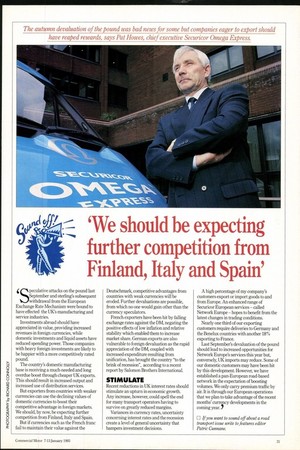P 'We should be expecting further competition from Finland, Italy
Page 33

If you've noticed an error in this article please click here to report it so we can fix it.
and Spain' 4 s peculative attacks on the pound last September and sterling's subsequent withdrawal from the European Exchange Rate Mechanism were bound to have effected the UK's manufacturing and service industries.
Investments abroad should have appreciated in value, providing increased revenues in foreign currencies, while domestic investments and liquid assets have reduced spending power. Those companies with heavy foreign investments are likely to be happier with a more competitively rated pound.
The country's domestic manufacturing base is receiving a much-needed and long overdue boost through cheaper UK exports. This should result in increased output and increased use of distribution services.
But exporters from countries with weaker currencies can use the declining values of domestic currencies to boost their competitive advantage in foreign markets. We should, by now, be expecting further competition from Finland, Italy and Spain.
But if currencies such as the French franc fail to maintain their value against the Deutschmark, competitive advantages from countries with weak currencies will be eroded. Further devaluations are possible, from which no one would gain other than the currency speculators.
French exporters have been hit by falling exchange rates against the DM, negating the positive effects of low inflation and relative stability which enabled them to increase market share. German exports are also vulnerable to foreign devaluation as the rapid appreciation of the DM, coupled with increased expenditure resulting from unification, has brought the country "to the brink of recession", according to a recent report by Salomon Brothers International.
STIMULATE Recent reductions in UK interest rates should stimulate an upturn in economic growth. Any increase, however, could spell the end for many transport operators having to survive on greatly reduced margins.
Variances in currency rates, uncertainty concerning interest rates and the recession create a level of general uncertainty that hampers investment decisions. A high percentage of my company's customers export or import goods to and from Europe. An enhanced range of Securicor European services — called Network Europe — hopes to benefit from the latest changes in trading conditions.
Nearly one third of our exporting customers require deliveries to Germany and the Benelux countries with another 18% exporting to France.
Last September's devaluation of the pound should lead to increased opportunities for Network Europe's services this year but, conversely, UK imports may reduce. Some of our domestic customers may have been hit by this development. However, we have established a pan-European road-based network in the expectation of boosting volumes. We only carry premium traffic by air. It is through our European operations that we plan to take advantage of the recent months' currency developments in the coming year. / If you want to sound off about a road transport issue write to features editor Patric Cunnane




























































